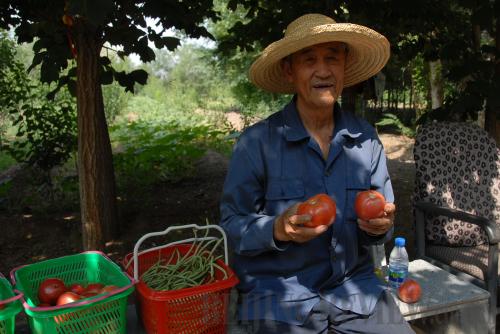|
 |
|
HAPPY HARVEST: Wang Yanming sits under the trees with tomatoes and vegetables picked in his garden on July 27 (BAI SHI) |
Karamay, 280 km northwest of Urumqi, capital of Xinjiang Uygur Autonomous Region, is well known for its spirit of triumph over a harsh natural environment, as it has embodied a transformation from desert wasteland to an urban oasis with a population of 290,000. Karamay's prosperity could not have been possible without the hard work of numerous pioneers.
Yanming Garden is an orchard on the outskirts of Karamay where an old man in a straw hat tends to the trees each day. The man, Wang Yanming, 81, is respected by the local people for his outstanding achievements in forestation.
"I first came to Karamay in 1955 with thousands of oil workers from my hometown in Hebei Province in north China," Wang told Beijing Review.
Wang worked in oil extraction for almost 30 years before he was appointed head of the No.2 Oil Production Plant of Karamay. But in 1986, he was diagnosed with heart disease and resigned, fearing his health troubles would become a burden.
"Though I left the position because of illness, I don't want to be a useless man. I still hope to do something within my strength," Wang said.
Wang requested to do gardening work for the factory, noting Karamay's desert ecology. Management agreed with him and offered him support. The environment around the factory gradually became more beautiful with more green plants.
In 1993, Wang officially retired at the age of 60. He turned his sights to a vacant wasteland near his residence, where saline-alkali soil was utterly devoid of plant life and contaminated with litter. Wang set out to turn this lot into forest.
Borrowing bulldozers and trucks from his former employer, Wang and other gardeners and landscapers started the difficult task of irrigating and fertilizing the land to support plant life. At first, Wang planted apple trees, but strong winds ruined the apples before they were ripe. Wang changed to planting plum trees, whose fruit can withstand wind. After three years, Wang's hard work came to fruition. His gardening project covers 85,700 square meters where practically nothing had previously existed.
The orchard now produces about 12 tons of plums every year, as well as other crops, most of which are donated to the No.2 Oil Production Plant of Karamay.
The factory recognized Wang's achievements when it named the orchard Yanming Garden in 1999. Wang refused the honors at first. "The garden could not have been built without other workers. I merely did what I should do," Wang said.
Today, during harvest season, many local residents visit Yanming Garden to enjoy the fruits of Wang's labor in this lush oasis.
While only 1 percent of the factory's property was originally green land, now plant life covers over 35 percent. Most of the trees and grass were planted by Wang and his colleagues.
Regarding his biggest gain over the past decades of planting trees, Wang said, "The work of forestation not only makes our environment much more livable, but also brings happiness to me."
"I have no longer shown symptoms of heart disease since I began planting trees. It is a miracle, isn't it?" Wang laughed. "For over 20 years, my heart has become one with this garden. It is a part of my life."
Email us at: baishi@bjreview.com | 